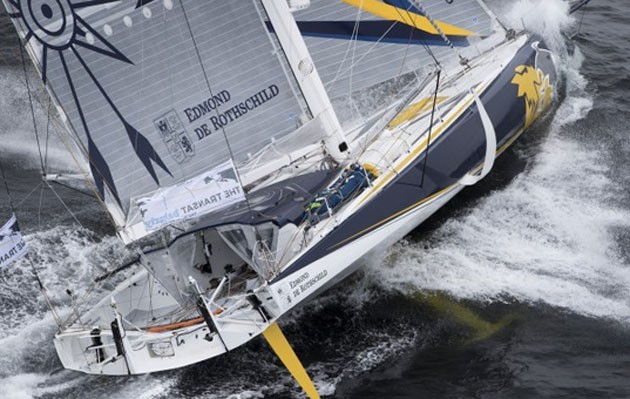Sébastien Josse, skipper of the IMOCA 60 Edmond de Rothschild, has been forced to retire from singlehanded race The Transat bakerly by mainsail damage
Going into the second day of racing, in the early hours of the morning on 4 May, Josse reported that he broached during a gybe, causing irreparable damage to a mainsail batten. He was sailing in 25-30 knots of breeze at the time, in the leading group of IMOCA 60s racing off Cape Finisterre, off the north-west tip of Spain.
“Everything happened very quickly, in maybe 10 seconds” reported Josse. “I broke the battens in the mainsail, which hold the top of the sail, in a violent gybe. Despite all precautions, it is unfortunate but these things can happen.
“The damage is not spectacular, but it is impossible to imagine I could continue the race. It is really disappointing – I was in the game, in contact with Armel [Le Cleac’h] and Vincent [Riou]. The boat was very well prepared. That’s all the more frustrating as I think the hardest part of this first race was behind us.”
This year’s The Transat bakerly is the first significant competitive test for the latest generation of IMOCA 60s being sailed solo. One of the key areas of development for skippers of the new generation IMOCA 60s, with their curved ‘lifting’ foils, has been refining the autopilots in preparation for events such as this year’s singlehanded marathon Vendée Globe, which sets off on 6 November.
Josse explained to Yachting World before The Transat bakerly start that when in foiling mode – typically in strong winds, on downwind and reaching angles – the new designs have an explosive and punishing movement that he described as ‘ricocheting’. Hence getting the trim settings right for the autopilot to respond quickly enough is an ongoing challenge to avoid the potential for damage caused by broaches under autopilot. Josse commented before the start that these boats are under autopilot “95 per cent of the time”, with hand steering reserved mainly for very light winds when sailing solo.
At the time of the incident, Josse was one of the front-runners among the six IMOCA 60s competing in the transatlantic race, which left Plymouth on Monday, 2 May. Edmond de Rothschild was just 3nm or so behind race leader Vincent Riou on board PRB, with Armel le Cleac’h’s Banque Populaire in close contention. All three teams gybed within a few minutes of each other onto a westerly heading, with Rio leading Le Cléac’h.
It will be an unwanted repeat of history for Josse, who was forced to retire from the last Transat, in 2008, also due to mainsail issues when he suffered mast track damage and head car failure on the IMOCA 60 BT. In the 2004 race he finished eighth, on VMI. He is currently heading to the Spanish port of Vigo (approximately 80nm away), where he will be met by members of the Gitana Team.

Sebastien Josse has been forced to retire from the Transat Bakerly race from Plymouth to New York.
Image licensed to Lloyd Images
Edmond de Rothschild is the third boat to retire from the race. Earlier that night, Erwan Le Roux, skipper of the Multi50 FenêtréA Cardinal sustained substantial damage to the port float on his trimaran.
Le Roux, a three-times winner of the Transat Jacques Vabre, was leading the Multi50 fleet when the incident occurred. “I had two reefs in the mainsail at the time and at first it was a big shock. I did not see what happened because I was under the cockpit cover,” explained Le Roux. “I had to intervene immediately to avoid a capsize. I went to roll the gennaker and that’s when I realised that about half of the float was missing.” Le Roux is heading to port near La Coruña, and is expected to arrive there within 24 hours.
The first retirement was Class40 skipper Maxime Sorel on VandB, who sustained damage to his bowsprit following a collision with a container ship in the northern Bay of Biscay.




